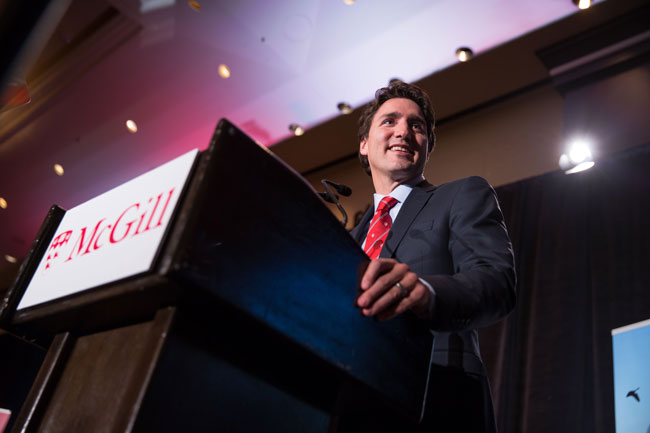
Prime Minister Justin Trudeau and his new Liberal government have enjoyed a significant honeymoon with Canadian voters in their first 100 days since last October’s general election that saw them win a surprisingly large majority. But, as McGill’s Political Science Professor Antonia Maioni observes in Four Burning Questions, now the hard part begins. With the economy under intense pressure because of falling oil prices and a sinking loonie, the challenges are even larger than foreseen last fall.
What do you think has been Justin Trudeau’s biggest success in the first 100 days of his mandate?
No surprisingly, it has been to embody the enthusiasm for change that was the leitmotif of the 2015 election. That change motif can be seen in the way in which Mr. Trudeau’s personal style is transforming the persona of the role of prime minister; the selection of an open, dynamic and diverse Cabinet; and the real sense of purpose and progress that now emanates from government institutions.
What has surprised you the most about the early going, both in terms of accomplishments and missteps?

The surprising element is the extent to which Mr. Trudeau’s perceived weaknesses – lack of experience, style over substance – have actually served him well in the sense of the authenticity and freshness he presents. As was the case during the campaign, he is obviously well surrounded by a core group, both personally and politically, who have made sure he has all the support he needs to succeed. As for the missteps, there have been a few awkward moments, and a few personal issues – “nannygate,” for example – that might have had longer legs if they hadn’t occurred during this honeymoon period. But so far, the Liberal government has been able to focus the public’s mind on a few key campaign promises and thus contain real opposition or critiques. As the dust settles, the devil will be in the details of the implementation and sustainability of these measures.
The Trudeau Liberals have enjoyed a significant honeymoon since their election on Oct. 19, and have enhanced it by moving quickly on a number of fronts, including such things as the restoration of the long-form census, unmuzzling scientists, changing the tone (if not the substance) of the conversation with First Nations, as well as Canada’s international environmental rhetoric. Some suggest they’ve got the easy stuff out of the way and the going is about to get much harder. How much harder do you think it will get and in what will those challenges be?
The real test of governing is now, as we move into a budget season in the midst of a very challenging economic situation. There are specific choices that have to be made with short- and longer-term consequences. The Liberal government has to get this right, as the decisions made now will have a palpable impact on Canada’s economic fortunes and on individual Canadians’ ability to weather the economic storms ahead. And it’s not just about big infrastructure investments and economic stimulus – it’s also about more mundane matters like funding for health care and pension reform. These issues will also set the tone for larger governance issues such as provincial-federal relations.
The Trudeau cabinet, gender balanced and more representative of Canada’s social diversity than its predecessors, is remarkable for the number of political neophytes holding senior portfolios – from Finance to Justice. How risky is that? How tolerant will Canadians be if rookie ministers stumble in the early going?
The Cabinet may seem diverse, but it is actually quite cohesive ideologically and most of its members are individuals keenly loyal to their leader. For critics of the centralization of power we have seen develop in Canadian politics over the past generation, that may not be an ideal situation. But the positive impact may be that these neophytes are open to learning and relying on evidence and expertise from government departments and beyond, making the policy-making process more informed and, hopefully, leading to coherent decisions and better outcomes.

haha..WHAT ABOUT THE ECONOMY??! IMF just downgraded Canada’s economic outlook!
I am always wondering of why there are only few (4 to 5) mega cities in Canada? Viz, Toronto, Montreal, Calgary and Vancouver and their greater neighborhoods. What if we start on building more number of similar cities with equal capabilities in terms of employment, education, energy, food and health resources. This might help in diverting the crowd from those densely populated areas towards the brand newer ones. Through this I see the possibility on creating more jobs and of creating brand new infrastructure that might use the latest human friendly technologies (considering energy efficient and environmentally friendly designs) and… Read more »